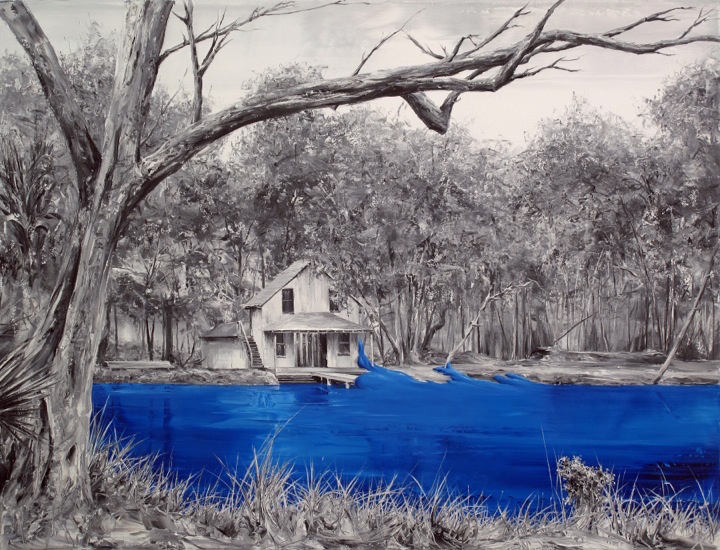Fahamu Pecou: Challenging Masculinity in the Media
With his painting All Dat Glitters Ain’t Goals recently featured alongside those by the likes of Gustav Klimt and Jean-Michel Basquiat on the fictional set of new American TV show ‘Empire’, Fahamu Pecou is an artist well on his way to achieving similar status in the real art world
With his painting All Dat Glitters Ain’t Goals recently featured alongside those by the likes of Gustav Klimt and Jean-Michel Basquiat on the fictional set of new American TV show ‘Empire’, Fahamu Pecou is an artist well on his way to achieving similar status in the real art world.
Working primarily through the medium of paint, Pecou utilises his own image as a black male to comment on contemporary representations of black masculinity as it is commonly depicted in hip-hop music and entertainment, satirising the over-inflated egos, explicit wealth, and bravado in his work:
“I appear in my work not in an autobiographical sense, but as an allegory. My character “Fahamu Pecou is The Shit!” embodies the traits typically associated with black men in hip-hop and juxtaposes them within a fine art context. This character becomes a stand-in to represent the ideals and ideas of black masculinity and both the realities and fantasies projected from and onto black male bodies.”
Exploring this territory breeds questions of what happiness and fulfilment actually are, skilfully tackled in recent exhibition ‘Pursuit of Happiness’ in New York’s Lyons Wier Gallery:
Pecou’s work asks “Who are we minus the labels and attachments of popular culture? What does "happy" actually look, and feel, like?”
The artist’s most recent solo show was at the Museum of Contemporary art of Georgia, a series of studies exploring the ability of black males to succeed in modern society; entitled ‘GRAV•I•TY’, the paintings used the fashion trend of ‘saggin’’ as an allegory to comment on contradictions of mobility, access and agency for young black men.
Other notable projects by the artist include a series of conversations that took place in the spring last year; entitled interSessions, Pecou invited figures from the hip-hop community to dialogue with figures from the art world on issues on a range of subjects related to the arts and entertainment, and their impact on popular culture and society.
Also working as a performance artist, writer, and scholar, Pecou is currently pursuing a Ph.D. at the Institute of Liberal Arts Emory University in Atlanta.
Fahamu Pecou Art
PACO POMET’s Surrealist Visual Games
Playing with vibrant colour, absurd details and shifts in perspective, Paco Pomet is an artist that demonstrates a propensity for surrealism, successfully converging fiction and reality in his oil paintings.
Pomet’s interests lie in exploring the grey area between the commonplace and the absurd –subverted landscapes and portraits borrow from sepia-toned vintage photographs resembling historical documents, the degree of manipulation of these sources varying from subtle to explicit and unrestrained.
Previous exhibitions include Shipwrecks, shown in Copenhagen’s Bendixen Contemporary Art gallery with works showcasing Pomet’s playful and oneiric style:
“Paco Pomet's paintings are visual games. At first sight they show a recognisable environment, but before long, the imitation of reality tips over into an illogical narrative that draws on the symbolic language of Magic Realism…. The author, as he has always done, invites the spectator to enter an exercise of interpretation where the constructive elements of the images are divested of all conventionality.”
Unambiguously titled Obra Reciente (‘recent work’), Pomet’s most recent exhibition in Madrid’s My Name’s Lolita Art gallery sees the artist tackling industrial progress as it took place early in the twentieth century.
Modifying source material from American municipal files, Pomet comments on civilizational regression, evident in the wounds inflicted to the landscapes portrayed – ‘Rojo’ (‘red’) depicts felled trees with their insides exposed and the workmen responsible flecked with a red element suggestive of blood. ‘Fin de siècle’ shows prospectors basking in the golden glow of the new century’s roman numerals, those of the last eerily looming over them in the background wooden and grayscale; the images are tainted with proleptic irony, the onslaught on the environment that would take place over the next century evident to all but those portrayed.
Completing a Fine Arts Degree at the University of Granada in Spain, Pomet went on to study at the School of Visual Arts in New York; He currently lives and works in Granada.
Paco Pomet



















